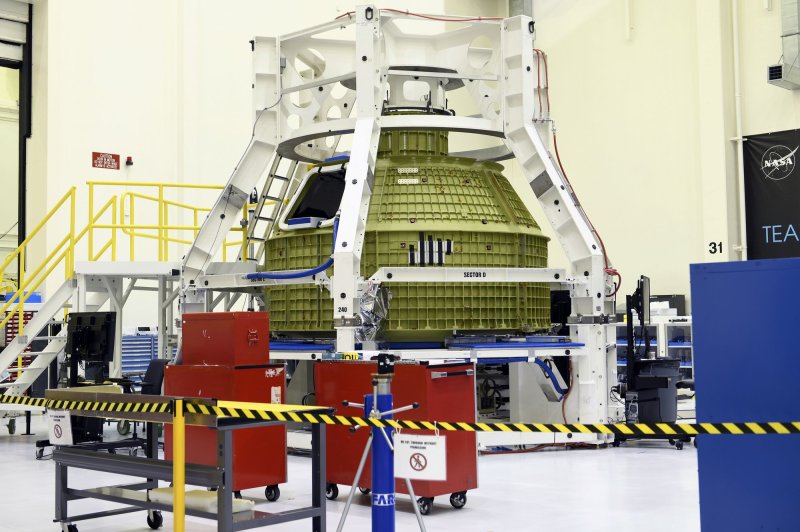UPDATE
NASA may not land people on moon again until 2027, new audit says

NASA's Orion spacecraft, scheduled for the Artemis III mission that would carry astronauts to the surface of the moon, is prepared for launch Nov. 5 at Kennedy Space Center in Florida. Photo by Joe Marino/UPI | License Photo
ORLANDO, Fla., Nov. 15 (UPI) -- Despite U.S. goals to land people on the moon again by 2024, delays of several years are likely, according to a NASA watchdog audit released Monday.
Former Vice President Mike Pence set that 2024 goal in a 2019 speech, giving NASA just five years to accomplish the feat.
While NASA reinforced the practicality of that goal for a long time, NASA Administrator Bill Nelson said Tuesday that the agency now plans to aim for 2025 because of funding shortfalls.
But the new audit from NASA's Office of Inspector General dashed the 2025 goal as unrealistic.
"Given the time needed to develop and fully test the [Human Landing System] and new spacesuits, we project NASA will exceed its current timetable for landing humans on the Moon in late 2024 by several years," the Office of Inspector General said.
The audit pins blames space agency management for the delays, as well as the COVID-19 pandemic, which interrupted work on NASA's moon rocket, and on "significantly less" congressional funding than NASA sought.
The agency requested $3.4 billion this year for the lunar Human Landing System program, but the Congress appropriated just $850 million. NASA awarded a contract to its lowest bidder, Elon Musk's SpaceX, to develop such a lander for $2.9 billion over the next few years.
The audit recommends that NASA develop a "realistic, risk-informed schedule" that includes potential delays to better align expectations with the development schedule for rockets, capsules, spacesuits and other systems.
The inspector general, Paul K. Martin, also recommended with his staff that NASA develop an Artemis-wide mission cost estimate and update it on an annual basis, and maintain an accounting of per-mission costs.
In its official response, the space agency said it didn't agree with those two recommendations.
NASA said it already follows its policies regarding cost estimates and argued that Artemis is a campaign, "and not an agency-defined program with a specific set of content or a period of time."
Regarding mission costs, NASA argued in its response to the inspector report that it "does not account, track or report costs on a per-mission basis ... because doing so would reduce contractual transparency to key stakeholders."
The agency didn't explain in its response who those stakeholders are.
"Breaking out costs to align by mission may lead to inefficiencies ... and may dis-incentivize contractors to continue innovating," NASA said in its response.
Jeff Bezos' Blue Origin filed formal protests and a lawsuit against NASA's award to SpaceX for the landing system, but a judge dismissed that suit Nov. 4.
Meanwhile, on Sept. 14, NASA awarded a new round of $146 million to five U.S. companies, including Blue Origin and SpaceX, to continue development of lunar landers for astronauts.
In its official response, the space agency said it didn't agree with those two recommendations.
NASA said it already follows its policies regarding cost estimates and argued that Artemis is a campaign, "and not an agency-defined program with a specific set of content or a period of time."
Regarding mission costs, NASA argued in its response to the inspector report that it "does not account, track or report costs on a per-mission basis ... because doing so would reduce contractual transparency to key stakeholders."
The agency didn't explain in its response who those stakeholders are.
"Breaking out costs to align by mission may lead to inefficiencies ... and may dis-incentivize contractors to continue innovating," NASA said in its response.
Jeff Bezos' Blue Origin filed formal protests and a lawsuit against NASA's award to SpaceX for the landing system, but a judge dismissed that suit Nov. 4.
Meanwhile, on Sept. 14, NASA awarded a new round of $146 million to five U.S. companies, including Blue Origin and SpaceX, to continue development of lunar landers for astronauts.
No comments:
Post a Comment